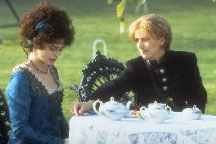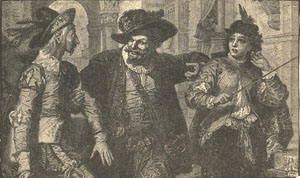TWELFTH NIGHT
ACT III
SCENE i
Viola (disguised as Cesario) has an exchange with Feste. When she commends his music and asks, "Dost thou live by thy tabor?" he says, "No, sir, I live by the church." "Art thou a churchman?" "No such matter, sir. I do live by the church; for I do live at my house, and my house doth stand by the church" (III.i.1-7). There certainly seems to be some kind of topical quibble or identity clue here. At least, the matter of bells connects with those of St. Benet (Anderson 246) -- a topical allusion to theaters vs. the Puritans. Feste defines his role as clown as a "corrupter of words" (III.i.36) and Viola indirectly alludes to her lovesickness. Feste acknowledges that "A sentence is but a chev'ril glove to a good wit. How quickly the wrong side may be turn'd outward!" (III.i.11-13). The elision harms the pun: turning "cheveril" inside-out gives us the inside syllable "ver" (Ogburn and Ogburn 283). Viola appreciates Feste's talents and, after some more quibbling about beards and coins and Troilus and Cressida, she privately renders a paean to the art of the fool:
This fellow is wise enough to play the fool, |

|
Olivia presses her case with Cesario (Viola). She wishes Orsino's "thoughts were blanks, rather than fill'd with me" (III.i.104). After an indignant but self-pitying bear-baiting conceit from Olivia (III.i.117ff), Viola comes to express the fact that she does have an authentic self and will remain master (or mistress) of it (III.i.158f). Much of the latter part of the scene transpires in rhyming couplets.
SCENE ii
Sir Andrew is annoyed that Olivia seems to favor Cesario over him and threatens to leave the premises. Fabian convinces him that Olivia was just trying to make Sir Andrew jealous to awake his "dormouse valor" (III.ii.19-20). He "should have bang'd the youth [Cesario] into dumbness" (III.ii.23), but he missed such an opportunity to impress Olivia. Sir Toby, starting to instigate a fight between the two, tells the silly git to compose a challenge to Cesario: "It is no matter how witty, so it be eloquent and full of invention. Taunt him with the license of ink" (III.ii.43-45). Fabian and Sir Toby have a laugh at the prospect of the lily-livered Andrew fighting the wimpy young man. Maria announces that Malvolio is about to make an ass of himself.
The mention of being a "Brownist" (III.ii.31) refers to Robert Browne, founder of the Congregationalist sect -- "the first Puritan-like separatists in England" (Farina 84) -- and a relative of Burghley. "He founded an independent church in 1580 and in 1582 went off into exile to the Netherlands" (Asimov 587). This would have been a topical allusion in the 1580s, but pointless later.
SCENE iii
Sebastian and Antonio have met up and now split again. Antonio reiterates the danger he is in from the "Count" and sends Sebastian to lodgings "In the south suburbs at the Elephant" (III.iii.39). In an act of "manly love" (Carey 337), Antonio also gives Sebastian his money until they meet later. The play's subtitle, "What You Will," may refer to any sort of gender pairing being available in this play for any individual's predilections. Antonio's affection for Sebastian seems fairly intense, like that other Antonio's for Bassanio in The Merchant of Venice.
SCENE iv
Olivia is distraught over Cesario: "How shall I feast him? What bestow of him? / For youth is bought more oft than begg'd or borrow'd" (III.iv.2-3). Maria prepares Olivia for Malvolio's odd behavior with references to "tainted" wits (III.iv.13), but Olivia figures, "I am as mad as he, / If sad and merry madness equal be" (III.iv.14-15).
Malvolio in his full glory seems like a lunatic in front of Olivia, or a victim of "midsummer madness" (III.iv.56). He smiles insanely and seems to be rambling incoherently when quoting from the letter. He mistakes her advice about going to bed as a come-on, quotes the letter more, and shows off his yellow stockings and cross-gartering, worse than breaking sumptuary laws (see Garber 529).
To see the self-destruction of a personage who cannot laugh, and who hates laughter in others, becomes an experience of joyous exuberance for an audience that is scarcely allowed time to reflect upon its own aroused sadism. (Bloom 240)Malvolio's costume visibly confirms him in what he is -- obstructed, repressed, blocked. We may recall his confident decoding of the counterfeit letter: "Why, this is evident to any formal capacity. There is no obstruction in this." Maria's trick, a clever psychological reading of Malvolio's character, intensifies his own characteristics, and causes "some obstruction" in the blood. (Garber 531)

|
As Mark Anderson has determined, this fashion faux-pas is actually an
in-joke for the court and "definitely not the way to warm the cockles of
Queen Elizabeth's heart. When Henry VIII's first wife Catherine of Aragon
died, the King celebrated by parading a two year-old Elizabeth around
with him at Greenwich. The brutish Tudor monarch, as a public symbol that
he was not in mourning, wore yellow, cross-gartered stockings. And then,
only five months after Elizabeth's father used her as a set piece for his
morbid merrymaking, the King had his second wife Anne Boleyn (Elizabeth's
mother) beheaded. One can only imagine the royal opprobrium Hatton would
have faced had he ever had the bad fortune of wearing yellow,
cross-gartered stockings in Elizabeth's presence" (posted at The
Shakespeare Fellowship 1/28/2002).
|
When a servant announces the arrival of Cesario, Olivia asks for Malvolio to be looked after by Sir Toby and the others. Malvolio finds further supportive evidence in this that Olivia does love him, and he is still dismissive of Sir Toby and the others in his arrogance as they treat him as if he were a madman: "You are idle shallow things, I am not of your element" (III.iv.123-124). Toby, Maria, and Fabian love the way it's working out so well: "If this were play'd upon a stage now, I could condemn it as an improbable fiction" (III.iv.127-128). They will next push the joke (or revenge) further and have Malvolio locked up as a lunatic "for our pleasure and his penance" (III.iv.137-138).
"More matter for a May morning" (III.iv.142): Sir Andrew has composed an unintentionally goofy letter of challenge to Cesario, which Toby reads aloud. Textual fun! The rhetoric is too polite and backfires, making Sir Andrew look like a moron in a whole new realm now. Toby takes the letter but tells Fabian he won't deliver it: "this letter, being so excellently ignorant, will breed no terror in the youth; he will find it comes from a clodpole" (III.iv.188-190). The fight will have to be finagled by word of mouth. Andrew, probably like Sir Philip Sidney against de Vere in the late 1570s, was "goaded into provoking a duel" (Anderson 151). Sidney is on record with another written challenge in 1578 to a Molyneux:
You have played the very knave with me, and so I will make you know if I have good proof of it. But that for so much as is past. For that is to come ... I will thrust my dagger into you, for I speak in earnest. In the meantime farewell. (qtd. in Ogburn and Ogburn 278)
| Olivia and Viola (as Cesario) are at another stalemate in the wooing. Sir Toby afterwards tells Cesario that a fight cannot be averted with the violent Sir Andrew, which comes out of the blue to her. Although Sir Andrew backpedals and a baffled Viola says any insult she may have made to him was against her will, Toby and Fabian insist to the individual reluctant duelers that the other refuses to back down. Their sword fight begins, no doubt intended to look goofy, when Antonio happens upon the scene. Antonio tries to take Viola's place (thinking she is really Sebastian), and when officers arrive to break up this disturbance, they arrest Antonio. One officer seems to recognize him and to know of his past crimes. Antonio asks Viola for his money back, but of course she knows nothing of this. At this perceived betrayal, Antonio rails about falseness, cast in his mind as a beauteous outside but evil empty inside: |

|
In nature there's no blemish but the mind;Antonio is hauled away. Although Viola now has every reason to believe Sebastian alive, her musings go nowhere, and she exits. Sir Toby eggs Sir Andrew on to go after Cesario, the coward, and continue the fight.
None can be call'd deform'd but the unkind.
Virtue is beauty, but the beauteous evil
Are empty trunks o'erflourish'd by the devil.
(III.iv.367-370)